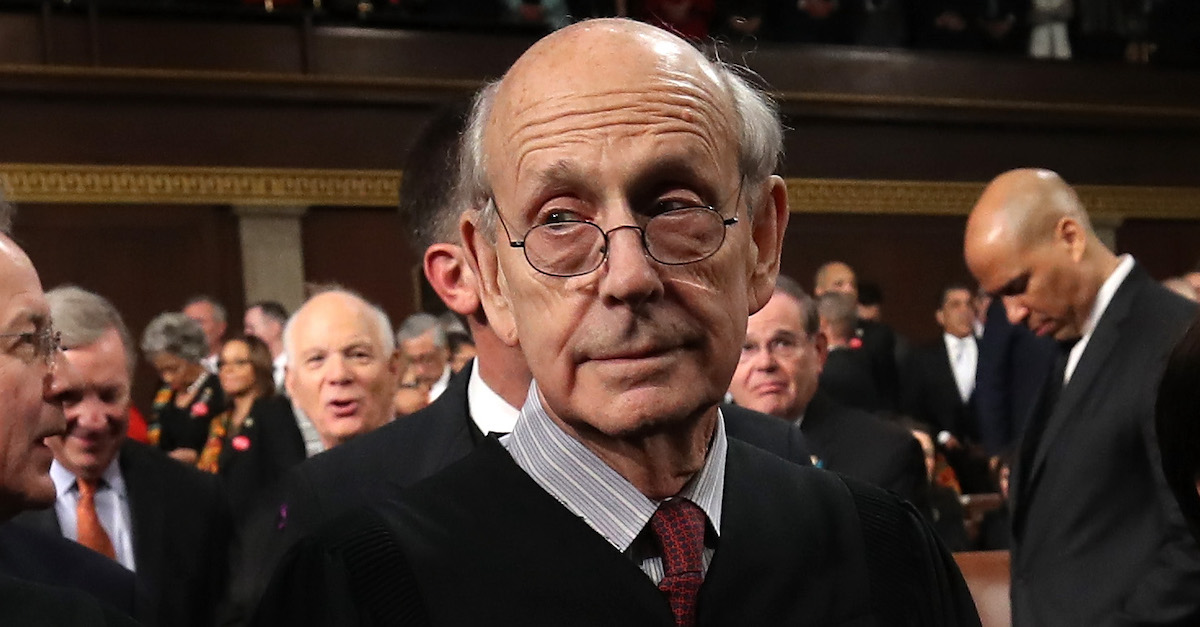
Supreme Court Justice Stephen Breyer on Friday altered the language of a recent opinion. The addition added a tone of civility to his judicial disagreement with Justice Amy Coney Barrett.
“For these reasons, I dissent,” Breyer ended his original dissent in a case stylized as U.S. Fish and Wildlife Service v. Sierra Club.
The tense conclusion to Breyer’s Thursday opinion raised some eyebrows in the legal community. Justices are generally known for — indeed, are expected to — disagree with civility. The omission was all the more noticeable because it came in response to Justice Barrett’s first majority opinion on the court.
As Law&Crime’s Colin Kalmbacher wrote Thursday, Breyer’s original language “foregoes the staid closing salutation of I respectfully dissent’ in favor of the terse ‘I dissent,’ which is decidedly a sign that the disagreement here is exceptionally sharp.”
Other observers noted that Breyer’s other dissent on Thursday did contain the requisite formalities.
“Because the Court comes to a different conclusion, with respect, I dissent,” Breyer wrote in opposition to Justice Neil Gorsuch in Pereida v. Wilkinson.
By Friday, Breyer softened his language vis-a-vis Justice Barrett via the issuance of a relatively rare revised opinion.
“For these reasons, with respect, I dissent,” Breyer now asserts with a renewed sense of cordiality.
The Supreme Court’s own website makes clear that slip opinions — which are issued immediately upon the adjudication of a case — are not the official, final version of the court’s say on a matter. For instance, page numbers and other ancillary matters are altered so as to insert the case into into the broader volume of the United States Reports where it will reside for the ages.
No other revisions have been docketed for the 2020 October Term of the Court. In late Oct. 2020, you may recall, Justice Brett Kavanaugh—days before the election—corrected a false claim in his concurrence in a mail-in ballot deadline matter. The correction was made after there was some outrage over his cherry-picking of a quote from a law review article.
The justices revised seven opinions during the court’s 2019 term.
Justice Clarence Thomas made a minor stylistic change to his opinion in Seila Law LLC v. Consumer Financial Protection Bureau.
He also altered the styling of a word in Monasky v. Taglieri.
Justice Sonia Sotomayor made two subsequent changes to her opinion in Financial Oversight and Management Board for Puerto Rico v. Aurelius Investment, LLC.
Sotomayor also adjusted a citation in Lucky Brand Dungarees, Inc. v. Marcel Fashions Group, Inc.
The Reporter of Decisions altered the syllabus of Georgia v. Public Resource.Org, Inc. The case syllabus is a summary of the matter prepared by Supreme Court staff for convenience only; it is not part of the core opinion.
Justice Neil Gorsuch made a change to his own dissent in Thryv, Inc. v. Click-To-Call Technologies, LP.
Most of the changes were minor — a letter here; a formatting matter there. Sotomayor’s multiple alterations added several clauses onto a sentence which did little more than add historical factual context to an argument. None were made to add a tone of civility to the underlying argument or disagreement among justices.
The justices altered eight opinions during their 2018 term, made eleven alterations in 2017 (including two to the high-profile Masterpiece Cakeshop decision), and altered one case in 2016. Six cases received revisions in 2015. Alterations are harder to track prior to 2015 because the court did not explicitly call them out on its own website.
“In case of discrepancies between the print and electronic versions of these bound volume materials, the print versions control,” the Supreme Court warns its observers. “Only the bound volumes of the United States Reports contain the final, official text of the opinions of the Supreme Court.”
[Photo by Win McNamee/Getty Images]